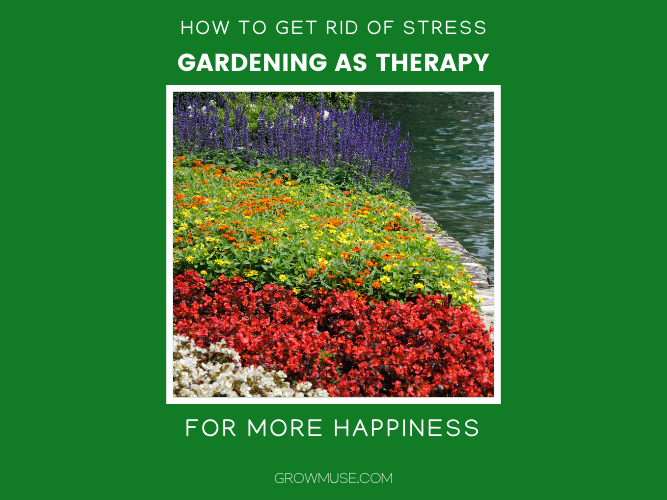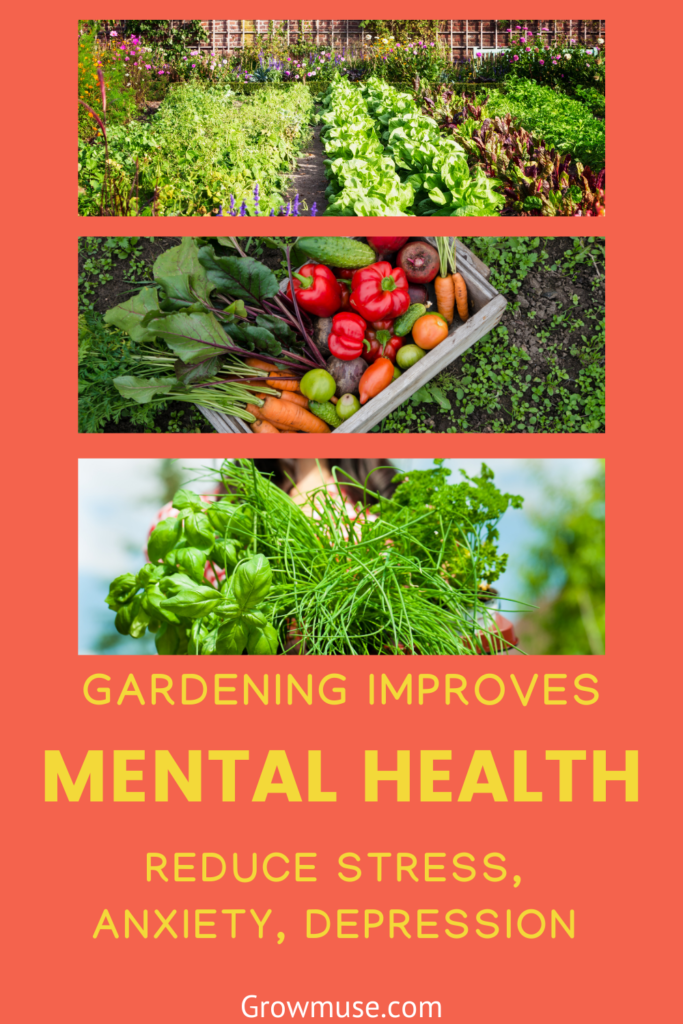
Any links on this page that lead to products on Amazon are affiliate links and I earn a commission if you make a purchase. Thanks in advance for your support! Read the full disclosure here.
Can using gardening as therapy really relieve anxiety, depression, and lift the stress out of our lives?
Think about your life. Are you being pulled in a ton of different directions? Trying to balance work, family, friends can be a nightmare. These demands may lead to high levels of stress and a whole bunch of other problems.
Focusing on mental health is important for our well-being. Luckily, more people are talking about dealing with these issues. There’s less of a stigma nowadays on intervention.
Table of Contents
REVELATIONS FOR GARDENING AS THERAPY
From traditional therapists to mental health apps, there’s an option out there for everyone.
Read on to learn more about gardening for mental health as I go into the meaning of green spaces, gardening for your body and mind, and chemical changes you’ll experience as a result of gardening.
Once you know the benefits, I’ll share how you can easily start gardening today with a quick shopping trip to the store or finding supplies online.
Let’s jump in and learn about gardening as therapy!
GREEN SPACE
First of all, what is green space? Green space is an open piece of land covered with grass, trees, and other vegetation.
Examples of green space include parks, community gardens, playgrounds, and vacant lots.
The benefits of simply being in green space include lower stress levels, lower blood pressure, and improvements in behavior and overall well-being.
GREEN CARE GARDEN THERAPY
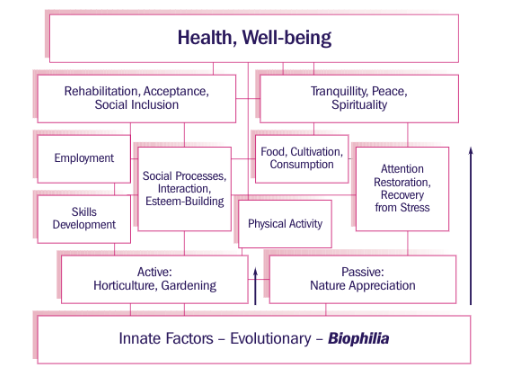
When you take green space and apply it to mental health you get green care. Green care is a type of therapy by plants and gardening.
From bottom to top of the chart above, you can see the final step reached when involved in green care includes health and well-being.
As humans, we have an innate appeal to nature. This is called biophilia.
Passive appreciation for nature could be observing a tree or a plant. Active appreciation includes actually participating in horticulture and gardening.
GARDENING EXERCISE
Go ahead and skip the gym. Pick up a trowel and start digging in the soil. Gardening activities can burn just as many calories, if not more, as other exercises in the gym.
When I am weeding or cleaning up the garden, I often will use garden shears to chop up the plants into smaller finer pieces for composting. I will tell you this is a very intense workout!
Think about bending (at the knees of course) and using your arms and hands to pour soil into beds or various containers for planting. This is a great way to build muscle strength and increase dexterity.
GARDENING FOR MENTAL HEALTH
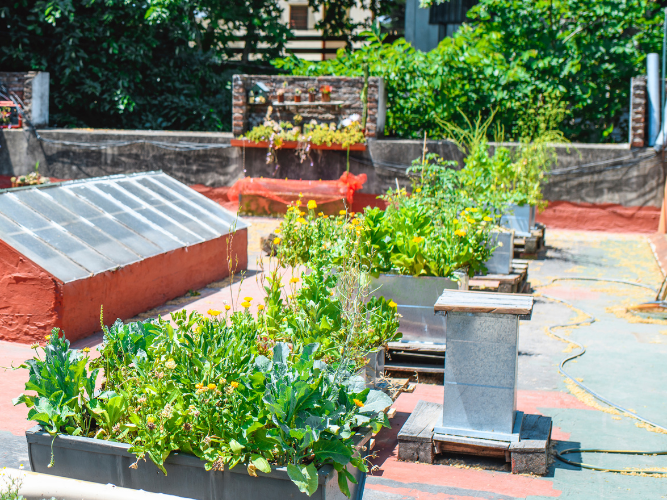
One study showed that urban rooftop gardening led to the enhanced physical and emotional well-being of those with intellectual disabilities and mental health disorders.
Participants looked forward to the gardening activity every week. It gave them an incentive to leave their homes and discover a new purpose in life.
I’ve seen this in my own life. Outdoor gardening forces me outside. I can be lazy at times but I want my plants to thrive.
Even when it’s below freezing, I’ll take a walk all bundled up to the garden to see how my plants are doing under the row cover. When I peak in and see nice lush greens thriving, I feel happier and prouder of my efforts.
Gardening also builds confidence. Any type of skill-building is rewarding, but when you see something grow out of dirt, it is incredible.
GARDENING PROTECTS AGAINST DEMENTIA
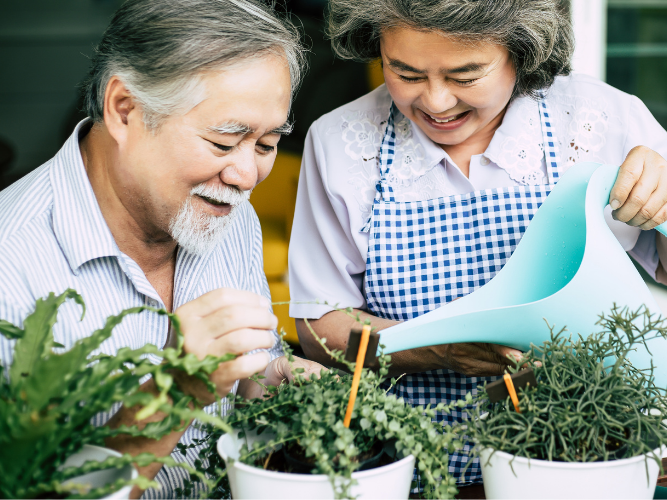
In an Australian study, physical activity, especially gardening, helped to protect men and women over age 60 against dementia.
Gardening was more effective than walking and moderating alcohol consumption!
THERAPEUTIC GARDENING HAS POSITIVE IMPACT ON VETERANS
Veterans at a 28-day inpatient substance abuse treatment program used gardening to reduce stress.
Some engaged in passive and/or active gardening. They reported feeling calmer and refreshed during and after their visits.
THERAPEUTIC GARDENS ON THE RISE
The American Society of Landscape Architects has a professional network of professionals who specialize in the design of therapeutic gardens.
Here are just a few therapeutic gardens:
- Buehler Family Foundation Enabling Garden at Naples Botanical Garden, FL
- Rochester General Hospital Strolling Gardens, Rochester, NY
- The Sensory Garden at St. John Neumann Nursing Home, Philadelphia, PA
THERAPEUTIC HORTICULTURE PROGRAM FOR SENIORS
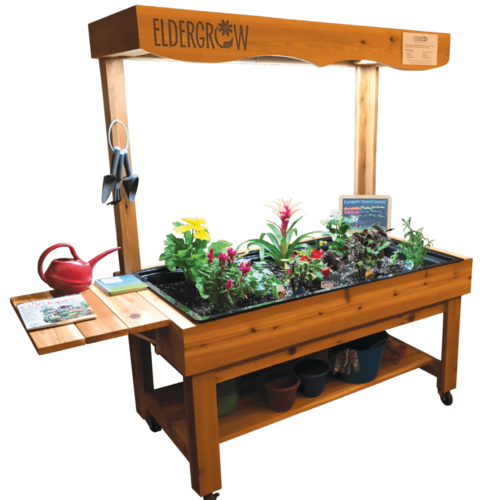
A company called Eldergrow brings gardening indoors for seniors. Realizing the easy access to indoor gardens, they help residents in senior living communities connect to nature year-round.
Eldergrow Therapeutic Horticulture Program:
- A full-service program combining Sensory Garden with onsite Educators
- Educators teach therapeutic horticulture classes
- Classes improve life for the growing community of older adults living in residential and nursing care
“We find that Eldergrow enriches the environment and provides a soothing, positive activity for residents, engaging them at many functional levels, whether individually or as part of a group.”
-Stuart Ostfeld, Vice President of Community Operations. Merrill Gardens, L.L.C.
CHEMICAL CHANGES IN BODY USING GARDENING AS THERAPY

There’s more than just anecdotal evidence that gardening is good for us.
REDUCE CORTISOL LEVELS
Saliva collected from participants before and after a 10-week gardening program found the total cortisol levels, a stress hormone decreased after the program ended.
After the program was finished, participants continued to engage in gardening activities.
REDUCE POSTPARTUM STRESS
A Japanese study found postpartum depression, anxiety, and quality of life improved through gardening activities.
This is so important given women with no history of depression before pregnancy can suffer from postpartum depression.
REFOCUSING YOUR ENERGY
Gardening allows your mind to focus your attention on something other than the pressures of everyday life.
Why not change the negative thoughts into positive ones?
Keep busy with your hands by taking care of your plants. Daily observations of your plant’s growth become special moments that bring joy and a sense of reward.
I have found that plants give back when you nurture them. The feelings you get are enormous.
Planting herbs and veggies especially give back as they nourish your body.
Re-energize yourself and boost your self-esteem through gardening!
BEING PRESENT IN THE GARDEN
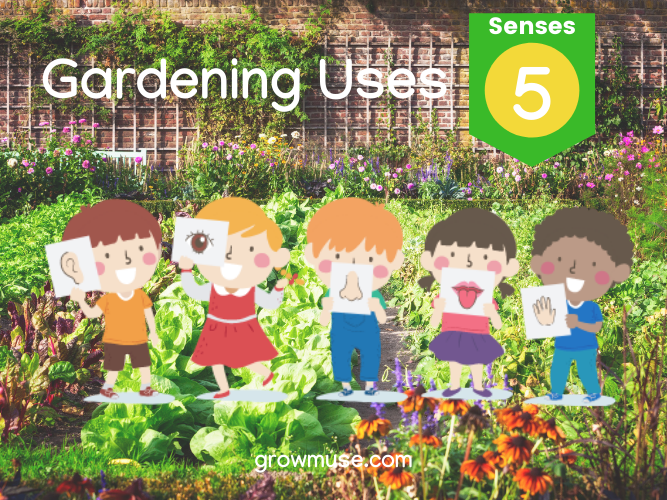
In today’s busy world, it’s hard to disconnect.
How many times a day are you looking at your phone while eating? What about listening to a podcast or music while walking or doing yard work?
It’s so rare that we get a moment to be present and focus on the task at hand.
When you are in the garden, try to be present. Take a moment and really think about what you’re doing.
Gardening taps into all five senses.
- LISTEN to the leaves crunch as you walk over them.
- TOUCH the soil and run it between your fingers.
- SEE the different colors and shapes of plants around you.
- SMELL the different scents from various plants.
- TASTE the different leaves from plants you have growing.
Take a moment to slow down and recognize the beauty of engaging your senses in the garden. You’ll begin to notice how being present helps reduce stress and increase happy hormones in your body.
GARDENING IS CHEAPER THAN THERAPY

Traditional therapy is important but it can be expensive.
Here’s how you can take advantage of gardening therapy without spending a ton of money and time.
Don’t try to be an overachiever and plan out a massive first garden. You don’t want more on your plate and add to your already high-stress.
START WITH A SMALL HERB GARDEN INDOORS
Plant something indoors on a south-facing windowsill. This eliminates the need for researching and buying grow lights.
Head to your local garden store. Even your grocery store will have plants ready for you.
Easy plants to grow indoors:
- Chives
- Mint
- Parsley
- Rosemary
- Thyme
COMPLETE GARDENING KIT OPTIONS
If you are super busy and want an all-in-one package, try this herb kit from Gardenuity.
If herbs don’t excite you, you can purchase another kit from Aerogarden that comes with a light and seed pods for you to grow a variety of plants. No soil required with this kit either.
My mother-in-law uses her Aerogarden to grow lettuce, basil, and other greens indoors in her basement.
Nurturing and caring for something small is meaningful. Seeing your garden grow and provide nourishment for you will give you a sense of accomplishment, boost your confidence, and give you the motivation you need!
Here’s a list of vegetables that grow fast to help you decide what to plant.
FINAL THOUGHTS GARDENING AS THERAPY
We live in such a high-stress environment. The demands from work, home life, and friends can be taxing.
Even the simplest gardens can have major impacts on our well-being and mental health.
We’ve seen positive impacts on people with intellectual disabilities, seniors suffering from dementia, veterans battling with substance abuse, and mothers fighting postpartum depression.
I’ve seen success in my personal life and hope you’ll give it a try.
Lower your stress levels and load up on happy hormones through gardening.
All it takes is bringing one plant into your life.
If you’re feeling really ambitious, check out this Vegetable Garden Planner to plan your garden outside.
Here’s a full set up of my raised garden bed as a first-time gardener.
What impact has gardening had on your life? Let me know in the comments!
Growmuse.com is a participant in the Amazon Services LLC Associates Program, an affiliate advertising program designed to provide a means for sites to earn commission by linking to Amazon.com. This is done at no cost to you. Read the full disclosure here.

